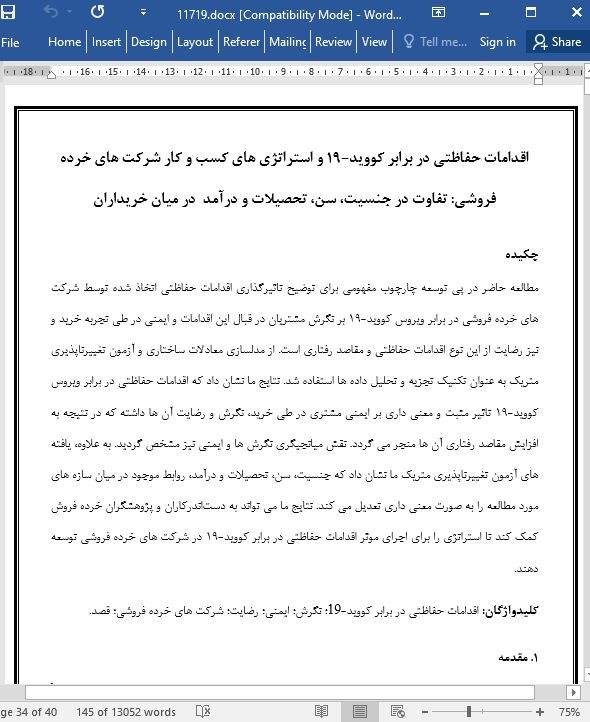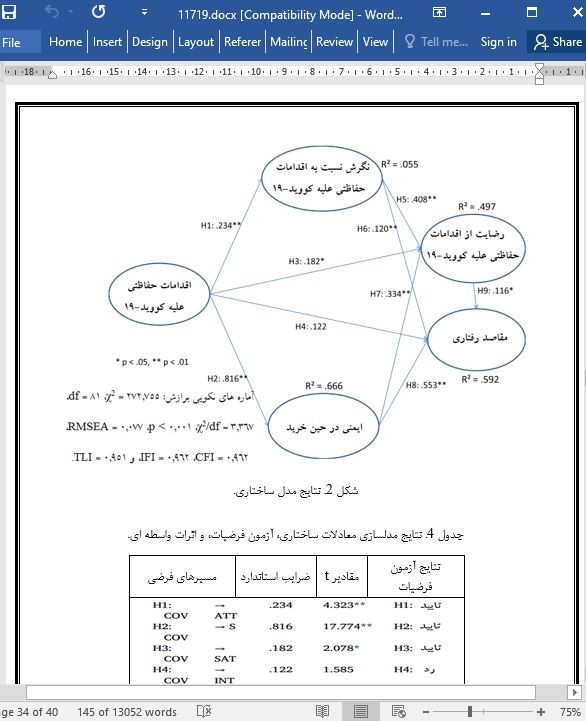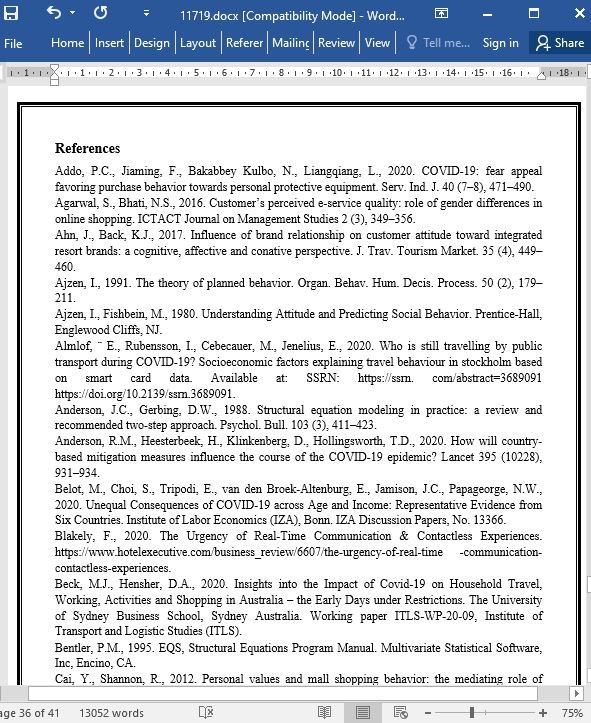
اقدامات حفاظتی در برابر کووید-۱۹ و استراتژی های کسب و کار شرکت های خرده فروشی
چکیده
مطالعه حاضر در پی توسعه چارچوب مفهومی برای توضیح تاثیرگذاری اقدامات حفاظتی اتخاذ شده توسط شرکت های خرده فروشی در برابر ویروس کووید-۱۹ بر نگرش مشتریان در قبال این اقدامات و ایمنی در طی تجربه خرید و نیز رضایت از این نوع اقدامات حفاظتی و مقاصد رفتاری است. از مدلسازی معادلات ساختاری و آزمون تغییرناپذیری متریک به عنوان تکنیک تجزیه و تحلیل داده ها استفاده شد. نتایج ما نشان داد که اقدامات حفاظتی در برابر ویروس کووید-۱۹ تاثیر مثبت و معنی داری بر ایمنی مشتری در طی خرید، نگرش و رضایت آن ها داشته که در نتیجه به افزایش مقاصد رفتاری آن ها منجر می گردد. نقش میانجیگری نگرش ها و ایمنی نیز مشخص گردید. به علاوه، یافته های آزمون تغییرناپذیری متریک ما نشان داد که جنسیت، سن، تحصیلات و درآمد، روابط موجود در میان سازه های مورد مطالعه را به صورت معنی داری تعدیل می کند. نتایج ما می تواند به دستاندرکاران و پژوهشگران خرده فروش کمک کند تا استراتژی را برای اجرای موثر اقدامات حفاظتی در برابر کووید-۱۹ در شرکت های خرده فروشی توسعه دهند.
۱. مقدمه
کروناویروس جدید (کووید-۱۹) بیانگر یک بحران سلامت جهانی شدید بوده و ثابت شده که به دلیل ماهیت شدیداً مسری آن برای جهان خطرناک می باشد (چان و همکاران، ۲۰۲۰؛ پرنتیس و همکاران، ۲۰۲۰). از مارس ۲۰۲۰، ویروس کووید-۱۹ به سرعت در سراسر جهان پخش شد و توسط سازمان بهداشت جهانی به عنوان یک پاندمی اعلام گردید (WHO، ۲۰۲۰). جهت پیشگیری / تقلیل گسترش و انتقال ویروس، دولت های سراسر جهان تدابیر و مقررات مهمی مانند محدودیت رفت و آمد جزئی یا کامل، خودجداسازی ، فاصله گذاری اجتماعی و ساعات منع تردد را اعمال کردند. همچنین، شهروندان ملزم شدند تا در مناطق عمومی از ماسک صورت استفاده نموده، از تجمعات بزرگ اجتناب کرده و مراجعه به فروشگاه ها را محدود نمایند. با این حال، اقدامات و مقررات مزبور تاثیر منفی عمده ای بر اقتصاد دنیا داشته اند (نیکولا و همکاران، ۲۰۲۰). به طور خاص، بخش هایی که عمدتاً متکی به سطوح بالایی از تعامل انسانی هستند مانند شرکت های خرده فروشی، بدترین تاثیر را تجربه کرده اند (هوک و همکاران، ۲۰۲۰).
۵. محدودیت ها و تحقیقات آتی
مطالعه حاضر دارای محدودیت های متعددی است که باید به آن ها اشاره نمود. نخست آنکه، تحقیق حاضر بر نگرش، ایمنی، رضایت، و مقاصد به عنوان پیامدهای مثبت تلاش های شرکت های خرده فروشی در راستای حفاظت از سلامت و ایمنی مشتری در حین خرید تمرکز داشت. تحقیقات آتی می توانند چارچوب مفهومی پیشنهادی را با گنجاندن سایر نتایج احتمالی اقدامات حفاظتی علیه کووید-۱۹ در زمینه خرده فروشی بسط دهند. در ثانی، این نظرسنجی در میان افراد رومانیایی برای گردآوری داده ها انجام پذیرفت. بنابراین، نتایج باید با احتیاط به مشتریان خرده فروشی ملیت ها / فرهنگ های مختلف تعمیم داده شوند. ثالثاً، چارچوب مفهومی در زمینه خرده فروشی مورد آزمایش قرار گرفت. در نتیجه مطالعات آتی می توانند چارچوب پیشنهادی را در انواع دیگری از خدمات از قبیل گردشگری، مهمان نوازی، آموزش و اوقات فراغت به کار گیرند.
Abstract
The present study sought to develop a conceptual framework to explain the influence of protective measures adopted by the retail enterprises against the COVID-19 virus on customers’ attitudes toward these measures, and the safety during the shopping experience, as well as the satisfaction with these types of protective measures and behavioral intentions. A structural equation modeling and metric invariance test were used as the data analysis technique. Our results revealed that the protective measures against the COVID-19 virus significantly and positively influenced customer safety during shopping, the attitudes and satisfaction, which contribute to an increase of their behavioral intentions as a result. The mediating role of attitudes and safety was also uncovered. In addition, our findings from the metric invariance test indicated that gender, age, education, and income significantly moderated the relationships among the studied constructs. Our results can help retail practitioners and researchers develop a strategy to effectively implement protective measures against COVID-19 in the retail enterprises.
1. Introduction
The new coronavirus (COVID-19) represents a severe global health crisis and proved to be disastrous the world over due to its highly contagious nature (Chan et al., 2020; Prentice et al., 2020). Since March 2020, the COVID-19 virus has spread rapidly around the world, which was declared a pandemic by the World Health Organization (WHO, 2020). In order to prevent/minimize the spread and transmission of the virus, governments worldwide imposed some important measures and regulations, such as partial or complete lockdowns, self-isolations, social distancing, and curfews. Also, citizens have been required to wear face masks in public areas, avoid large gatherings, and limit visits to stores. However, these measures and regulations have had a major negative impact on the economy worldwide (Nicola et al., 2020). In particular, the sectors that rely predominantly on high levels of human interaction, such as retail enterprises, have experienced the worst impact (Hoque et al., 2020).
5. Limitations and future research
This study contains several limitations that need to be pointed out. First, this research focused on attitude, safety, satisfaction, and intentions as the positive consequences of the retail enterprises’ efforts to protect customer health and safety during shopping. Future research could expand the proposed conceptual framework by including other possible outcomes of the protective measures against COVID-19 in a retail context. Second, the survey was conducted among Romanian individuals in order to collect the data. Therefore, the results should be cautiously generalized to retail customers of different nationalities/ cultures. Third, the conceptual framework was tested in a retail context. Consequently, future studies could apply the proposed framework to other types of services, which could include tourism, hospitality, education, and leisure.
چکیده
۱. مقدمه
2. بررسی ادبیات
2.1. اقدامات حفاظتی اتخاذ شده توسط فروشگاه های خرده فروشی در برابر کووید-۱۹ و تاثیر آن ها
2.2. نگرش
2.3. ایمنی در حین خرید
2.4. رضایت و مقاصد رفتاری
2.5. تاثیر تعدیل کنندة ویژگی های جمعیت شناختی
3. روش شناسی و نتایج
3.1. بخش خرده فروشی در رومانی در شرایط پاندمی کووید-19
3.2. چارچوب مفهومی
3.3. مقیاس های اندازه گیری و تدوین پرسشنامه
۳.۴. گردآوری داده ها و ویژگی های نمونه
3.5. تجزیه و تحلیل داده ها و نتایج
3.6. آزمون تغییرناپذیری
۴. بحث و پیامدها
۵. محدودیت ها و تحقیقات آتی
ضمیمه
رفرنس
Abstract
1. Introduction
2. Literature review
2.1. Protective measures adopted by the retail stores against COVID-19 and their impact
2.2. Attitude
2.3. Safety during shopping
2.4. Satisfaction and behavioral intentions
2.5. The moderating influence of demographic characteristics
3. Methodology and results
3.1. The retail sector in Romania in the context of the COVID-19 pandemic
3.2. Conceptual framework
3.3. Measurement scales and questionnaire development
3.4. Data collection and sample characteristics
3.5. Data analysis and results
3.6. Invariance test
4. Discussion and implications
5. Limitations and future research
Appendix. Frequency of the retail stores included in the study
References
- اصل مقاله انگلیسی با فرمت ورد (word) با قابلیت ویرایش
- ترجمه فارسی مقاله با فرمت ورد (word) با قابلیت ویرایش، بدون آرم سایت ای ترجمه
- ترجمه فارسی مقاله با فرمت pdf، بدون آرم سایت ای ترجمه



